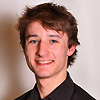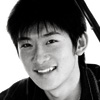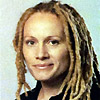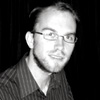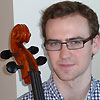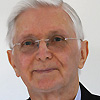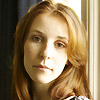Jill Wall talks to Douglas Lilburn (1971)
This is a transcript of an audio interview between Jill Wall and Douglas Lilburn in 1971. While we have made every effort to accurately transcribe the audio there may be minor variations from the original recording.
[electronic music]
Jill: Those sounds you've just heard were constructed here at Victoria University's Electronic Studio by the Director of the studio, Professor Douglas Lilburn. But I should ask you first, professor, whether I used the right word when I say constructed.
Douglas: I think constructed is a very good word for a sample like that, because in this case I had to establish the source material of the various kinds of brass noises and various natural sounds, and do a lot of processing of these, and then synchronize various tapes after a lot of measuring. In fact it's quite a long and complicated job to realize something of that kind.
Jill: Can you give me an illustration, then, of something which uses non-natural sounds, if you like – gongs and drums and that sort of thing – that doesn't use those sounds?
Douglas: Oh, surely! For instance, something like this.
[electronic music]
Douglas: Now, those sounds, in fact, came out of this new machine we got here in 1970 called the Putney VCS3. It is a complete little portable studio, miniaturized. It will make an incredible variety of sounds of that kind, and in a case like this, I think rather than say constructed I would like to use a word like instructed, because I give the machine general directions about the length of the sound event and the shape of it and the kind of material the machine should use, and then the machine itself will fill in all the complex detail. So this is a new way of automating sounds. One doesn't want to use an older word like compose, I think, because it has so many associations already. You know that image of the composer sitting at his desk and laboriously, hour after hour, week after week, putting notes onto paper and then waiting a long time, possibly, for somebody to play them back. And I think the word that composers prefer now in the studio is a word like realize, because it's a general sort of word. It does take stock of the composer and of the machines and of the whole apparatus of the laboratory.
Jill: Now, this electronic studio was largely your own baby, wasn't it? How did you begin? You didn't begin with a sophisticated machine like the one you've just referred to, did you?
Douglas: Oh no. In fact it's quite a long story, I suppose. It began way back in the 1950s when people in the music department became aware of this new medium of electronic sound. We picked this up from LPs, from radio, and from articles in esoteric magazines. And about 1962, I think it was, NZBC Productions offered me the script of a new play, “The Pitcher and the Well”, and we all talked about this and all decided that it needed some new kind of sound treatment. Now, I didn't know how to realize this, and the NZBC didn't have the facilities at that time. [stumble, then aside to interviewer] Should I do that one again? I didn't know how to realize this, and the NZBC didn't have the facilities at that time, but this did coincide with some University leave I had. So I went off and visited various studios in various parts of the world, and then had the good luck to work for three months in Toronto, where I gained basic knowledge of technique and equipment. When I came back in 1964 I had to put in my report to the Vice Chancellor, of course, and then was given a green light to go and seek help from where I could get it. In fact, I gained a great deal of help from the NZBC, from the Arts Council, as it was then, and from the University Grants Committee, and from VUW physics department, and various technicians in the DSIR and in the NZBC. Particularly, I'd like to mention Mr. Wallace Rirey [sp?], technical officer of the NZBC, whom I had the good luck to meet in 1964, and he helped me design the whole studio. And in fact, he maintains it now and helps develop it.
Jill: In fact, you are developing it then, piece by piece, are you, as you require various sounds from it?
Douglas: Oh, continually. This depends a lot and of course on how much money one can get, or how much money one can earn through the studio.
Jill: Professor, how much did you have to understand, yourself, the physics of sound?
Douglas: Well I've really done no more than the ordinary sort of training in acoustics and things like this, and I've picked up a lot more knowledge, of course, while working in the studio here. I think it's very important that composers should have some knowledge of the actual physical qualities of the material they're using – the sound material – in the studio, because this helps you quite quickly to establish your sound sources sometimes, or it helps you to realize the technical processes of dealing with a particular bit of sound. But one is never quite sure what is going to come up from some new lineup of equipment. You see, each of these instruments has an individuality of its own and a vast potential to be discovered, and when you begin to make one of these instruments operate on another you get quite a fantastic potential of effects sometimes, to be discovered. And one has to discover them because there is no regular manual for this kind of job yet.
Jill: But you're also here as a teacher, aren't you? At what stage does the student coming to Victoria University, perhaps to do a Bachelor of Music degree, come to you for electronic training?
Douglas: Well this varies considerably according to the general course of the student. It's usually the composers who finish up down here rather than the historical people or the performers. But I think all students now would be subjected to a certain amount of electronic sound, at some stage, either in concert or in class in their first year. And if they're going to go on towards a composition degree, then they begin to take acoustics first-year, and acoustics second-year, and in the second year they begin to move into the studio to get some preliminary working knowledge of it. And when they've done all that they're then prepared to come down here and spend an Honor's year actually doing a composition paper in the studio.
Jill: You've mentioned really the sort of music that people associate most obviously with electronic music, and that is music as effect, music for film, music for theater, not music in its own right. Do you see the future of electronic music mainly in these divisions rather than becoming a tool for the composer, alone?
Douglas: No. I don't see why it should do that any more than ordinary music or ordinary sound effects do. I think they can be used in both these fields very readily. I think at this stage of development of electronic music it is a great help for the understanding of it sometimes if it is actually associated with non-musical things like plays or productions, talks of various kinds, or dance, film, anything of this kind which gives it ready associations for people. I think it should be able to do, finally, anything that was done in those old Italian opera houses in the 17th century, and out of that, finally, comes your abstract symphonic language for the great Viennese school.
Jill: But you don't really require this do you, for a concert hall, because it lacks any involvement on the part of the people listening to it?
Douglas: Well, I think electronic composers are still looking for a solution as to how to present their work in concert performance. It's not a very happy business, of course, just to line up an audience in front of some loudspeakers and sit them there when they are, in fact, used to looking at personalities performing on the stage. And various composers, particularly Stockhausen, are looking for ways around this by having performers on the stage, and at the same time manipulating their sounds electronically. And an advanced country like Sweden, for instance, has just, with government help, designed a vast new center for electronic music and for performance of this – a special kind of concert hall.
Jill: On the third point of this, though, I can see a danger that with, say, your new synthesizer here in the studio, anyone who comes along to perhaps learn the technique of electronic music can pretty well, by pushing and selecting a few buttons, make sounds. Well, the difficulty becomes then to change this so-called sound into composition. You know, if you can make it chatter at you, where do you get to?
Douglas: [laughing] I was going to say, can't anybody do exactly the same thing with a piano or with various other kinds of musical instruments, too? In fact, it's not so hard to do that, but the real crunch comes later when you have to organize these sounds into a pattern that is going to convince some other composer, say, or a musical audience. And this still means that the composer has to work very hard, even though the machine has prepared a lot of his raw materials for him.
[electronic music]


